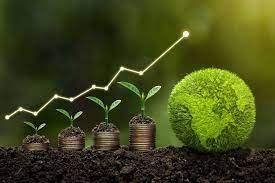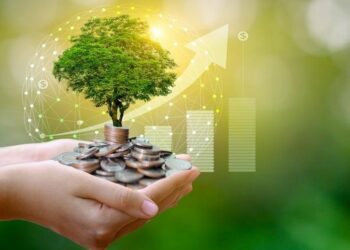The financial world, long perceived as a purely profit-driven engine, is undergoing a profound and irreversible transformation. A new paradigm is emerging, one where capital flows are not solely guided by the promise of financial returns, but also by a deep-seated commitment to environmental and social well-being. This is the essence of sustainable finance, a movement that integrates environmental, social, and governance (ESG) considerations into investment and lending decisions. It’s a powerful response to the urgent challenges of climate change, social inequality, and corporate irresponsibility. No longer a niche for a handful of ethical investors, sustainable finance has matured into a mainstream force, redefining what “value” means in the modern economy. This article will delve into the core principles of sustainable financial practices, explore the market forces that have fueled their rapid rise, and examine the new financial products and strategic shifts that are building a more resilient, equitable, and sustainable global economy.
The shift towards sustainable finance is driven by a powerful confluence of factors: changing consumer values, new regulatory pressures, and a growing body of evidence that purpose and profit are not mutually exclusive. A new generation of investors, particularly Millennials and Gen Z, is increasingly demanding that their money be aligned with their values. They want to know that their investments are not contributing to climate change or human rights abuses. At the same time, governments and central banks are recognizing that climate-related risks—from extreme weather events to the transition to a low-carbon economy—pose a significant threat to financial stability. This has led to a wave of new regulations designed to promote transparency and accountability in financial markets. This push from both investors and regulators is forcing financial institutions to adapt, leading to the creation of a sophisticated ecosystem of products and services that were unimaginable just a decade ago.
The Three Pillars of Sustainable Financial Practices
Sustainable finance is not a singular concept; it’s a comprehensive approach built on three core pillars that guide decision-making and measure success.
I. Environmental (E): Investing in a Healthy Planet
The “E” in ESG is the most prominent pillar and a primary driver of the sustainable finance movement. It focuses on how companies and financial institutions manage their impact on the environment.
- A. Climate Risk and Opportunity: This involves assessing both the physical risks of climate change (e.g., assets in flood-prone areas) and the transition risks (e.g., the cost of moving away from fossil fuels). Financial institutions are now using this data to stress-test their portfolios and identify new investment opportunities in climate-resilient sectors.
- B. Green Bonds and Loans: A green bond is a fixed-income instrument designed to raise money for projects that have a positive environmental or climate-related impact, such as renewable energy projects or sustainable forestry initiatives. Similarly, green loans are specifically designed to finance environmentally friendly projects. These products have created a new class of financial instruments that directly link capital to environmental outcomes.
- C. The Circular Economy: Sustainable finance is a key enabler of the circular economy, which aims to minimize waste and maximize resource efficiency. Investors are funding companies that are developing new business models based on recycling, reuse, and repair. This is a shift from the traditional “take-make-dispose” model to a more regenerative one that is both economically and environmentally sound.
- D. Natural Capital and Biodiversity: Beyond climate, investors are now considering a company’s impact on biodiversity and natural capital—the world’s stock of natural resources. This includes everything from the health of forests and oceans to the availability of clean water. Finance is being directed toward projects that protect ecosystems, as businesses and investors realize that a healthy planet is the foundation of a healthy economy.

II. Social (S): Creating a More Equitable Society
The “S” in ESG focuses on the social impact of a company’s operations and investments. It addresses a wide range of issues, from employee well-being and diversity to human rights and community engagement.
- A. Impact on Communities: Sustainable finance is being used to fund projects that have a direct, positive impact on communities. This includes investments in affordable housing, access to clean water, and community-based healthcare facilities. The goal is to allocate capital in a way that helps to address social inequalities and build more resilient communities.
- B. Fair Labor Practices: Investors are scrutinizing a company’s supply chain to ensure that workers are treated fairly, that labor rights are respected, and that there is no forced or child labor. This is a shift from simply outsourcing production to ensuring that a company’s entire value chain operates ethically.
- C. Diversity, Equity, and Inclusion (DEI): The social pillar also includes a focus on DEI. Investors are now looking at the diversity of a company’s leadership and workforce, as research shows that diverse teams often lead to better financial and operational outcomes. Capital is being directed toward companies that are committed to creating a more equitable workplace.
- D. Access to Financial Services: Sustainable finance is also about financial inclusion, providing underserved populations with access to basic financial services like banking, credit, and insurance. This includes investments in microfinance institutions and fintech startups that are using technology to reach people who have been traditionally excluded from the formal financial system.
III. Governance (G): Building Trust and Transparency
The “G” in ESG refers to the way a company is managed and governed. It is often considered the foundation of the other two pillars, as poor governance can undermine even the most well-intentioned environmental and social efforts.
- A. Board Independence and Structure: Investors are looking at the composition and independence of a company’s board of directors, ensuring that the board has the expertise and independence to provide effective oversight.
- B. Executive Compensation and Transparency: This involves scrutinizing executive compensation to ensure it is aligned with long-term performance and sustainability goals. Transparency in financial reporting and a company’s ESG metrics is also a key component of good governance.
- C. Shareholder Rights: Sustainable finance also advocates for strong shareholder rights, ensuring that investors have a voice in a company’s direction and can hold management accountable for their actions and their impact.
- D. Anti-Corruption and Ethical Conduct: A company with strong governance will have robust anti-corruption policies and a clear code of ethical conduct. Investors are looking for these signals as an indicator of a well-managed and trustworthy organization.
The Role of Technology and the Future of Sustainable Finance
Technology is a key enabler of sustainable finance, providing the tools needed to measure, report, and manage ESG data at scale. The use of artificial intelligence, big data analytics, and blockchain technology is fundamentally changing how investors and companies approach sustainability.
- A. AI-Powered Data Analysis: AI algorithms can now analyze vast amounts of data—from satellite imagery to social media sentiment—to provide real-time ESG scores for companies. This allows investors to make more informed decisions and provides a more accurate picture of a company’s true impact.
- B. Blockchain for Supply Chain Transparency: Blockchain’s immutable ledger is being used to create tamper-proof records of a product’s journey from its origin to the consumer. This transparency helps to ensure that products are ethically sourced and that a company’s sustainability claims are legitimate.
- C. The Impact of Green Fintech: A new generation of fintech companies is emerging that is focused exclusively on sustainable finance. These “green fintech” firms are creating apps that allow consumers to invest in climate-friendly projects, platforms that track a user’s carbon footprint, and tools that make it easier for companies to report on their ESG performance.
The Challenges and a Call to Action
Despite the rapid growth, sustainable finance faces several challenges. There is still a lack of standardized metrics for measuring impact, which can lead to confusion and the risk of greenwashing. The industry needs to develop a universally accepted framework for reporting on a company’s ESG performance. There is also a need for greater education and awareness among investors, as many are still not aware of the sustainable investment options available to them.
The future of sustainable finance is a future where all investing is, in some way, sustainable. The goal is not for sustainable investing to be a separate category but for ESG factors to become a fundamental component of every investment decision. The movement represents a powerful shift in the relationship between finance and society, moving from a model that focuses solely on profit to one that recognizes that a healthy economy depends on a healthy planet and a just society. It’s a call to action for investors, companies, and individuals to use the power of capital to build a better world for generations to come.













